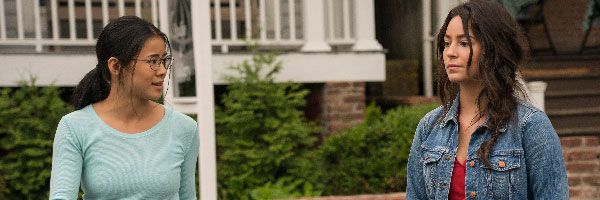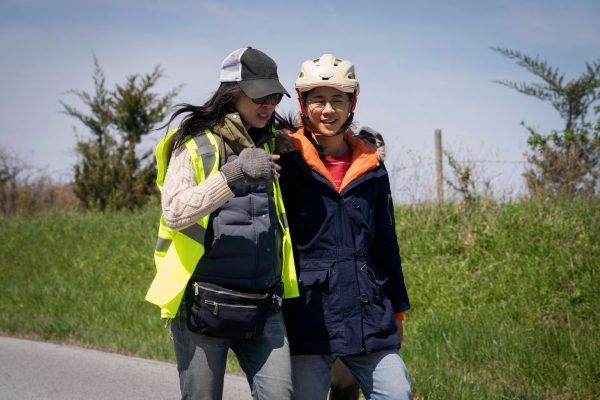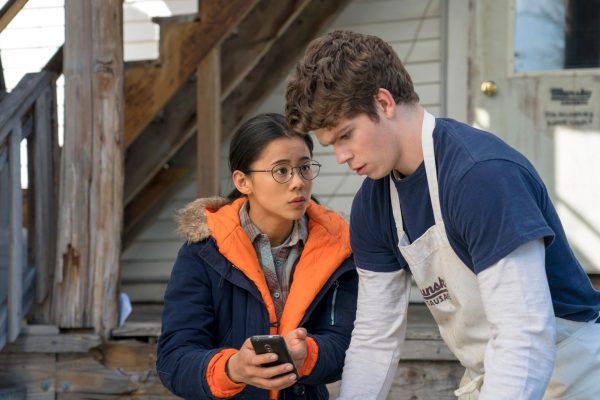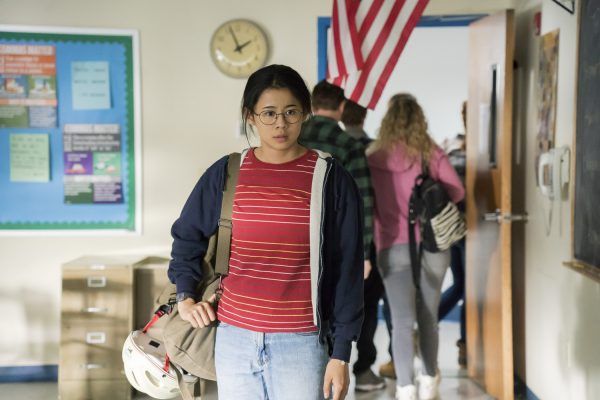For anyone who saw Alice Wu's The Half Of It pop up on their Netflix account and brushed it off as another formulaic teen romcom, I have to encourage you to give it a shot. While it does work with some familiar genre techniques and formulas, they're being used to bolster an exploration of some very relatable, complex themes and ideas. If you're still on the fence about whether or not to watch, hopefully my review will sway you so that you can read the following discussion on the ending of the movie. Here's your one and only spoiler warning! This article contains spoilers for the ending of The Half Of It.
If you're still with me, you're well aware that The Half Of It didn't give you any easy answers. Perhaps you were rooting for Ellie (Leah Lewis) and Paul (Daniel Diemer) to get together, or maybe you wanted Ellie and Aster (Alexxis Lemire) to live happily ever after; neither happened. Paul makes his move, but Ellie isn't interested in him like that and while Ellie does eventually build up the nerve to kiss Aster, then she immediately leaves Squahamish to attend Grinnell College.
While chatting with Wu, she was kind enough to indulge me and answer a few spoiler questions so I asked if she was ever concerned about not giving viewers the thing they might have been rooting for the entire movie, in this particular case, seeing two characters get together.
Let's say you're rooting for Paul and Ellie to be together in the end and then when they're not, you walk away disappointed. How do you make sure that sinks in in a way where you're satisfied with a story that doesn't follow the formula that you're used to and you also learn something in the process?
ALICE WU: I try not to think about it as you learn something, as much as I think about what is emotionally true. And it’s so funny, it's like depending on who you are, you could be disappointed that Paul and Ellie didn't end up together, or you could be disappointed that Ellie and Aster don't end up together. [Laughs] There’s a very vocal group on Twitter right now that is just like, ‘If Ellie and Aster don't end up together, they're going to be …’ But the thing is, this is a spoiler thing, for me, the goal was never - it's funny, I do do this somewhat subversive switch on you where it starts off feeling like this will be a romantic comedy, and then I switch it in the middle because the reality is it's not about who gets the girl. I think this is the happiest ending possible because I do think this is true to all three characters. If Ellie is trying to pretend, has a massive crush on Aster, maybe she's lesbian, maybe she's bi, who knows? She's 17, anything can happen! But we definitely know she can like girls, right? And I think that it's not really true to her to romantically fall in love with Paul. That actually isn't really true to her trajectory and what is best for her.
And for Paul, I actually think, yeah, he might have been falling for Ellie, but I think what he truly loves about Ellie is just confusing because in his head, guys and girls can only date, right? He doesn't have any girl friends, and so I think this happens a lot for straight guys who only have guy friends is that they become friends with a girl and their only context for that is, ‘Well then, we must be dating.’ But that doesn't have to be true. And I kind of really wanted this moment where it's a triumph for all three, because really, if you think about, if the end of it is Paul and Ellie are together and then Ellie's just in this town, that's not actually a happy ending for her. Or Ellie and Aster are together and they're both stuck in this conservative town; that's also not a happy ending.
The happiest ending is for what would be best for each of those characters. For Ellie, that is getting a chance to pursue her dream and actually go to Grinnell. For Paul, it's finally being able to say to his family, ‘Hey, listen to me. I have an idea.’ It might seem silly, but I actually think it’s a huge triumph for him that he's making his sausages and his family's now listening. He's gonna save his family from financial ruin, and that's the best thing for him. It's everything he loves and wants. And for Aster, finally being able to be like, ‘You know what? I started painting again, I want to go to art school.’ That is the best ending for her, for someone who's 17. The end of the movie is really the beginning, right? These are not 90 year olds about to die. If they're about to die, then sure, why not get together? [Laughs]
But their lives are barely starting, so it's not actually the happiest thing to be like, ‘And then they …’ - that follows a formula, but I think as an audience, we're far more sophisticated now. If anything, I would say romantic comedies sometimes in some ways feel like fairy tales now and they’re like this fun fantasy where you go on - and it's not that two people can't find each other and be incredibly happy; it's just that we also now know that, and then what happens after the camera stops rolling? Are they gonna stay together? Are they gonna get divorced? There are any number of things that might happen. So I actually think what you want to do is be true to your characters and give them what would actually be happy. If it is truly being married to that person, great, then that should be the end of your movie! For these three characters that would not be the happiest thing for them. And I guess as a filmmaker, your characters are like your children, so you're gonna want the best for your children.
I also wanted to ask you about the very end of the movie. You end on a shot of Ellie, but what inspired the choice to give us some close-ups of other people on the train as well?
WU: The story’s just so hyper focused on her and then these other two people, and I start the movie talking about everyone's looking for their other half, right? People always looking and wondering, and not able to find. I always knew I wanted the last shot to be on Ellie because I think a lot about first shot, last shot. So it's significant to me that the first time we see Ellie, we effectively see the back of her, her back is to us, right? And then the last shot of Ellie, I always knew it was gonna be full on, just right on her face.
There's a moment where we see the fear, we see the vulnerability, and then we see this moment where she kind of looks up and she just looks directly ahead and there's a confidence. Her eye line and the way that works is in no other place in the movie. The reason why is there should just be this feeling of like, ‘Oh!’ We don't know what's gonna happen to her, she doesn't know for sure what's gonna happen to her, but we kind of know she's gonna be okay. And more importantly, she knows she's gonna be okay, right? And to get there, why there’s the shots of the other people is there's this moment where Paul's just run past, she turns, she's crying for the first time, and then there's just this moment like, it's just her on a train by herself, on her way. And then she looks over and you see that every other person is also looking out the window.
It's this sense of longing, like everyone's looking for something. Is it their other half? Is it what they want to do in their life? Everyone is looking for something. And we end that sequence on her also looking out the window, but at that point, she stops looking out the window, she turns and we see her go through those emotions, and then we see her just looking dead ahead, and we see her have that beat of like, 'Okay. I'm ready for the world,’ and then we're out. I think it's my attempt to lift this into, ‘Look, this is a feeling we all have. This is the human condition.’ We all were brought up to think that we need to find something to complete ourselves. Even though this might seem like a tiny story about these three kids in this tiny town, this is the human condition. And I wanted to end on this feeling of hope, like we watched these kids go through it and all three of them now got to move forward in their lives. And there's just that sense that, yeah, everyone could be looking, but everyone could get to the place Ellie gets to.




